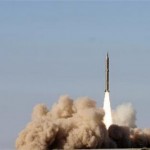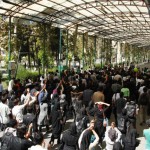Tuesday
Sep292009
UPDATED Iran's Nuclear Programme: Scott Lucas in La Stampa (English Text)
 Tuesday, September 29, 2009 at 9:04
Tuesday, September 29, 2009 at 9:04
Non-Proliferation and “Iran’s Nukes”: Chris Emery on Al Jazeera English
The Latest from Iran (28 September): Signals of Power
Receive our latest updates by email or RSS SUBSCRIBE TO OUR FEED
Buy Us A Cup of Coffee? Help Enduring America Expand Its Coverage and Analysis
 UPDATE 29 September: Many, many thanks to an EA reader who translated the interview.
UPDATE 29 September: Many, many thanks to an EA reader who translated the interview.
I had a long chat with Francesca Paci of the Italian newspaper La Stampa on Sunday, starting from the news of Iran's missile tests to consider the "secret nuclear plants" and the politics leading up to Thursday's meeting in Geneva of the "5+1" powers and Iran. Paci's original article is on the La Stampa website.
So Now, Ahmadinejad is Back in the Saddle
Professor Lucas from University of Birmingham: Nuclear Programme Serves to Divert Attention from Domestic Problems in Iran
PACI: What are the aims of the launch of the Zelzal missiles by the Iranian Army on a war footing?
LUCAS: The true goal of these large-scale manoeuvres in Tehran is to reduce Ahmadinejad's internal opposition. While the West responds to the military provocation of Ahmadinejad, he fights a definitive battle for his national legitimacy.
Rockets allow the Iranian leader to credit himself with the power that the June elections have called into question. So does the relaunching of the nuclear threat.
PACI: Let's start with the missiles: Why a bellicose military demonstration just now?
LUCAS: Iran is preparing itself for Thursday's meeting in Geneva [with the US, UK, France, Germany, Russia, and China] and wants to arrive there with the toughest possible stance. When the second uranium enrichment facility was revealed, Ahmadinejad's government said he would consider the visit of International Atomic Energy Agency inspectors, but 24 hours later he said he had done nothing wrong, and now he launches missiles. Tehran cannot afford to snub the talks but Ahmadinejad wants to meet the 5+1 powers in a strong position.
PACI: Monday the Islamic Revolution Guard Corps tested the Shahab 3, a powerful missile potentially able to reach Israel.
LUCAS: I do not think the launch changes the military situation. The timing is what matters most. Ahmadinejad wants to promote himself, and the West has fallen into the trap.
Iran is not currently violating the Non-Proliferation Treaty, according to which the second enrichment plant must be declared six months before receiving uranium. Even the Americans have said the plant will be operational "within a year". The Subsidiary Clause to the NPT, setting tougher conditions for the IAEA to inspect the facilities has never been ratified by the Iranian Parliament, although Iran accepted it on a voluntary basis between 2003 and 2007. No infringement therefore, so far. But in emphasizing the challenge of Ahmadinejad to the United Nations, the media gave him the political stature that the June vote had deprived him.
PACI: The Iranian president speaks to the world so that his own country hears him ?
LUCAS: Yes, and the American media have swallowed the bait. In New York, Ahmadinejad founded everything on the nuclear issue, thus managing to deflect attention from his domestic problems. He gave five interviews that accredited him as a leader, and he achieved an important point in using the nuclear threat to stabilize its legitimacy at home, where the opposition is far from being tamed.
PACI: Is it conceivable that he will succeed in a remobilization of the Iranian people as the country faces possible new sanctions?
LUCAS: Not this time. Two years ago the manoeuvre succeeded, but after the vote in June, national pride is no longer a strong point for Ahmadinejad: after all, all the election's candidates were in favor of nuclear power. Iranian people have realized that the President is using the excuse of endangered sovereignty in order to protect himself.
PACI: What do you think of the strategy of President Obama?
LUCAS: The White House already knew about the new installation in Qom. Why do they denounce it now?
Well, Obama was waiting for the right moment to increase pressure on the Iranian government, who must have understood this and spoke before Washington could unmask the "secret plant".
The US Administration is divided. Some sincerely support the diplomatic policy, others consider the dialogue as impossible and push for military action. Obama plays on both sides. His strategy is good, but the tactics suffers from these divisions. Iran is a key actor in the region: if it were to be attacked, the Middle East would be lost. America can not ignore it, not least because of its role in Afghanistan. This is why Richard Holbrooke [Obama's special envoy for Afghanistan and Pakistan] insists on negotiations.
The Latest from Iran (28 September): Signals of Power
Receive our latest updates by email or RSS SUBSCRIBE TO OUR FEED
Buy Us A Cup of Coffee? Help Enduring America Expand Its Coverage and Analysis
 UPDATE 29 September: Many, many thanks to an EA reader who translated the interview.
UPDATE 29 September: Many, many thanks to an EA reader who translated the interview.I had a long chat with Francesca Paci of the Italian newspaper La Stampa on Sunday, starting from the news of Iran's missile tests to consider the "secret nuclear plants" and the politics leading up to Thursday's meeting in Geneva of the "5+1" powers and Iran. Paci's original article is on the La Stampa website.
So Now, Ahmadinejad is Back in the Saddle
Professor Lucas from University of Birmingham: Nuclear Programme Serves to Divert Attention from Domestic Problems in Iran
PACI: What are the aims of the launch of the Zelzal missiles by the Iranian Army on a war footing?
LUCAS: The true goal of these large-scale manoeuvres in Tehran is to reduce Ahmadinejad's internal opposition. While the West responds to the military provocation of Ahmadinejad, he fights a definitive battle for his national legitimacy.
Rockets allow the Iranian leader to credit himself with the power that the June elections have called into question. So does the relaunching of the nuclear threat.
PACI: Let's start with the missiles: Why a bellicose military demonstration just now?
LUCAS: Iran is preparing itself for Thursday's meeting in Geneva [with the US, UK, France, Germany, Russia, and China] and wants to arrive there with the toughest possible stance. When the second uranium enrichment facility was revealed, Ahmadinejad's government said he would consider the visit of International Atomic Energy Agency inspectors, but 24 hours later he said he had done nothing wrong, and now he launches missiles. Tehran cannot afford to snub the talks but Ahmadinejad wants to meet the 5+1 powers in a strong position.
PACI: Monday the Islamic Revolution Guard Corps tested the Shahab 3, a powerful missile potentially able to reach Israel.
LUCAS: I do not think the launch changes the military situation. The timing is what matters most. Ahmadinejad wants to promote himself, and the West has fallen into the trap.
Iran is not currently violating the Non-Proliferation Treaty, according to which the second enrichment plant must be declared six months before receiving uranium. Even the Americans have said the plant will be operational "within a year". The Subsidiary Clause to the NPT, setting tougher conditions for the IAEA to inspect the facilities has never been ratified by the Iranian Parliament, although Iran accepted it on a voluntary basis between 2003 and 2007. No infringement therefore, so far. But in emphasizing the challenge of Ahmadinejad to the United Nations, the media gave him the political stature that the June vote had deprived him.
PACI: The Iranian president speaks to the world so that his own country hears him ?
LUCAS: Yes, and the American media have swallowed the bait. In New York, Ahmadinejad founded everything on the nuclear issue, thus managing to deflect attention from his domestic problems. He gave five interviews that accredited him as a leader, and he achieved an important point in using the nuclear threat to stabilize its legitimacy at home, where the opposition is far from being tamed.
PACI: Is it conceivable that he will succeed in a remobilization of the Iranian people as the country faces possible new sanctions?
LUCAS: Not this time. Two years ago the manoeuvre succeeded, but after the vote in June, national pride is no longer a strong point for Ahmadinejad: after all, all the election's candidates were in favor of nuclear power. Iranian people have realized that the President is using the excuse of endangered sovereignty in order to protect himself.
PACI: What do you think of the strategy of President Obama?
LUCAS: The White House already knew about the new installation in Qom. Why do they denounce it now?
Well, Obama was waiting for the right moment to increase pressure on the Iranian government, who must have understood this and spoke before Washington could unmask the "secret plant".
The US Administration is divided. Some sincerely support the diplomatic policy, others consider the dialogue as impossible and push for military action. Obama plays on both sides. His strategy is good, but the tactics suffers from these divisions. Iran is a key actor in the region: if it were to be attacked, the Middle East would be lost. America can not ignore it, not least because of its role in Afghanistan. This is why Richard Holbrooke [Obama's special envoy for Afghanistan and Pakistan] insists on negotiations.

 As Iran tested long-range missiles on Monday , Reuters considered
As Iran tested long-range missiles on Monday , Reuters considered  1940 GMT: Pedestrian offers
1940 GMT: Pedestrian offers 
